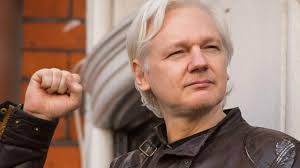Julian Assange, the founder of WikiLeaks, is set to make a final appeal to the High Court in the UK, according to his wife, Stella, on Thursday. This development comes after another judge recently rejected his previous motion, paving the way for his potential extradition to the United States.
In a tweet, Stella Assange stated, “On Tuesday next week, my husband Julian Assange will make a renewed application for appeal to the High Court. The matter will then proceed to a public hearing before two new judges at the High Court, and we remain optimistic that we will prevail and that Julian will not be extradited to the United States.”
She further emphasized the gravity of the situation, highlighting the charges Assange faces in the US and the potential consequences he may endure. Stella Assange stated, “He faces charges that could result in him spending the rest of his life in a maximum-security prison for publishing true information that revealed war crimes committed by the US government.”
Assange’s previous appeal against the June 2020 extradition order was rejected earlier this week by Justice Jonathan Swift of the High Court of England and Wales. The judge dismissed all eight grounds for his motion, granting Assange a five-day deadline to present his case before a two-judge panel.
Reporters Without Borders (RSF) strongly criticized the ruling, denouncing the significant impact it could have on journalism globally. RSF’s Rebecca Vincent emphasized the urgent need to protect journalism and press freedom, calling on US President Joe Biden to drop the charges against Assange and facilitate his release without further delay.
The US government has charged Assange under the Espionage Act, accusing him of conspiracy to hack Pentagon computers related to the 2010 publication of Iraq and Afghanistan war diaries. If convicted, he could face a sentence of up to 175 years in prison. Assange maintains that the documents were leaked to him by a whistleblower and that WikiLeaks’ publication of the information constituted protected journalism under the First Amendment of the US Constitution.
Assange’s arrest in April 2019, following Ecuador’s revocation of his asylum, led to the unsealing of the indictment. He sought refuge in Ecuador’s embassy in London in 2012, accurately anticipating the US government’s intent to apprehend him on false grounds. Due to the UK’s denial of safe passage, he remained trapped in the embassy for nearly seven years. Since then, he has been held in London’s Belmarsh maximum-security prison for the past four years while awaiting extradition proceedings.
According to RSF, the upcoming appeal represents Assange’s final opportunity to contest extradition within the UK, unless he decides to bring his case to the European Court of Human Rights. As the legal battle unfolds, the world watches closely, recognizing the pivotal role it plays in defending truth, journalism, and press freedom in the face of potential persecution.





